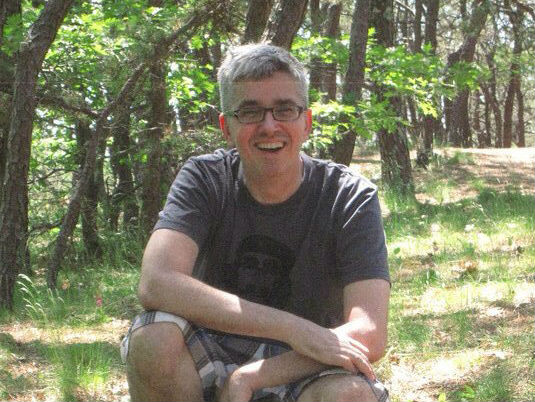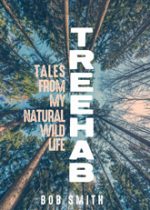Bob Smith: On Religion, Life with ALS, His Love of Nature, and His New Book ‘Treehab’

Author: Christopher Bram
September 20, 2016
“I want a God who’s not meaner than I am.”
In the wider world of pop culture, Bob Smith is known as a stand-up comic. He was the first openly gay stand-up to appear on the Tonight Show. This was followed by many other appearances, including a special on HBO. He toured the country for several years in the groundbreaking comedy trio Funny Gay Males, performing with his buddies Jaffe Cohen and Danny McWilliams. His smart, wry, low-key comedy monologues, which you can see on YouTube, are unique in tone and full of memorable lines. Years before I met him, I often quoted (with attribution) such Smith bits as: “My high school had a Head Start program for homosexuals. It was called Drama Club.”
But in the smaller world of book readers, Smith is known as a writer. And he’s a wonderful writer. This should be no surprise. Good writing is full of the same attention to detail, originality, and surprise that powers the best stand-up comedy.
Smith began with two collections of autobiographical essays, Way to Go, Smith and Openly Bob. He then turned to fiction, writing two excellent novels, Selfish and Perverse and Remembrance of Things I Forgot. The first is about Alaska. The second–my personal favorite–is a dizzying tale of time travel where a gay man in his forties zooms back in time to meet his younger self. The two decide to save the world, only to find they are being pursued through time by that greatest of arch-villains, Dick Cheney.
Smith’s newest book, Treehab: Tales from My Natural Wild Life, is another collection of essays but with a wider, richer range than his first books. It’s a glorious achievement, one that has already earned high praise from Kirkus, Stephen McCauley and Armistead Maupin. This is The Portable Bob Smith. There’s a lot of Smith to carry, but the book carries it with ease. We hear about his love of nature, of rocks and minerals, and Alaska. He tells stories of his career as a stand-up, as well as what it’s like to be the sperm-donor dad of two children. He talks about his dog Bozzie and his four best friends, the men he calls his “Nature Boys,” which includes his life partner Michael Zam. And he discusses his experience with ALS, also known as Lou Gehrig’s disease, a neuro-degenerative disease that affects the motor neurons. It can work quickly or slowly. Stephen Hawking has lived with it for years. Luckily for Bob its progress has been slow. He was diagnosed with ALS twelve years ago and has been able to keep working. The first thing he lost was his ability to speak. In the early stages he assured his stand-up audiences that his slurred speech didn’t mean he was drunk, only that he had a neurological disorder.
When Bob could no longer perform, he concentrated on his writing. He wrote material for other comics, and he continued to produce novels and essays. Still able to use his hands, Bob typed endlessly and steadily on his iPad, producing many drafts of each piece which he showed to friends for feedback. He has a real gift for working with other writers, developed while working with Funny Gay Males followed by writing television comedy on such shows as Mad TV. I’ve had the privilege of being part of this process myself. Bob can take a minor niggle or query and turn it into something far better than anyone anticipated. His ego is always focused on producing the best work possible. He is a gifted pro.
I recently spoke with Bob about his new book. He’s temporarily lost the use of his hands and can no longer type. He now spells out words with his feet, pointing at letters on a Lucite board. But Bob expresses himself better with his feet than most people do with a fully functioning set of fingers. Also present was Bob’s best friend, Eddie Sarfaty, a brilliant stand-up comic and fine writer in his own right, author of Mental: Funny in the Head. Eddie is now working on his own novel.
Eddie knows Bob well enough that he can often finish his answers once Bob begins them, but not always. We sometimes put words into Bob’s mouth in what follows, but he always agreed with what we attributed to him.
Your love of Alaska shines throughout this book. There are four different essays about the forty-ninth state, and it makes guest appearances elsewhere. Which do you love more, the landscape–or the guys?
Both. I like a hot guy against a cool background.
Anyone who visits you will inevitably find a TV show about Alaska playing in the background. It can be about anything from cops to salmon to real estate. Is there actually an entire cable channel devoted to Alaska?
No, but there should be. I really love Alaska State Troopers. My favorite trooper is Gabe.
Eddie: Bob loves Alaska. He’ll watch anything from Alaska fishermen to Alaska telemarketers.
What is the oldest essay here and when did you write it?
The essay about my dog, Bozzie, written in 2012 for a collection titled I’m Not the Biggest Bitch in This Relationship.
You regularly mix comedy with profundity even in your titles. The piece on Boswell, aka Bozzie, is called “Walking My Dog Through the Valley of the Shadow of Death Is a Nice Way to Start My Day.” Did that title come late or was it there all along?
It came later. But it was the first time I wrote about my ALS.
Do you have a favorite essay?
“Nature Boys.”
Eddie: Because boys and nature are his two favorite things.
It’s a wonderful portrait of your best friends, four gay men who are bound together by their love of wildlife and the great outdoors.
You are full of love, Bob. You love so many things: birds, books, friends, your partner Michael, your two children, Maddie and Xander, Alaska, of course, and Henry David Thoreau. But you also have the healthy gift of anger. Who are some of the people and things that make you furious?
The Koch Brothers. Donald Trump. Climate change deniers. People who don’t believe in evolution. The Koch Brothers. (Again!) Soy milk. The NRA. Unfunny comedians.
Do you want to name a few unfunny comics?
(He smiles and shakes his head.)
Who are your heroes?
Thoreau. Mary Leakey. Verner Wilson [a Yupik storyteller and environmental activist from Alaska]. Lily Tomlin. W. C. Fields. Maude Lechner [the daughter of friends, who shaved her head to raise money for ALS when she was eleven].
Who are your favorite writers? You’re the man who turned me on to P. G. Wodehouse, for which I am eternally grateful. Who else do you love?
Evelyn Waugh. Dawn Powell. Charles Dickens. Stephen McCauley. Armistead Maupin. Jane Austen. Ronald Firbank. Tolkien.
That’s right. You’ve been a huge fan of Lord of the Rings from an early age.
(Bob nods eagerly.)
You have not been able to talk for five years now, but you can still type. Did this make writing harder for you?
No. Good writing is always difficult.
Did your words become more concentrated when you couldn’t say them aloud but had to save them for the written page?
Yes. I think my writing became better.
I think so too.
Eddie: I agree.
This is a stupid question, but how badly do you miss the laughter of a stand-up comedy audience? Is there an equivalent for a book writer?
(Bob sadly shakes his head.)
Eddie: But you get letters from your readers. Often for books years after you wrote them.
But it’s too bad I can’t do stand-up anymore. Because ALS is hilarious.
The book includes a beautiful essay where you visit Walden Pond and find yourself talking with the ghost of Henry David Thoreau. Your Thoreau is not the gentle celibate nature lover we read about in high school, but a very tough, passionate gay man with a sex drive. Where did your sense of him come from? A particular biography? His journals? Or was it something you understood intuitively from early on?
All of the above. Plus the men I met in Alaska.
You were brought up Catholic but you come across in the book as a cheerfully moral pagan. You explore your religious ideas in an extraordinary essay, “WWJD: What Would Jackie Do?” Jackie is an acupuncturist who is your ideal of compassion. The essay is so full of wonderful things—including anger and tenderness—that it can’t be summed up in a simple phrase or two. So let me ask a series of questions. Do you consider yourself a Christian?
(Bob aggressively shakes his head.)
An agnostic?
(Bob shakes his head again.)
A pantheist?
(He frowns, then shrugs.)
An ancient Greek pagan? The Romans were too brutal, right?
(Bob nods.)
A Native American pagan?
(Bob nods again.)
A mixture of the best of all those traditions?
(He nods more eagerly.)
I want a God who’s not meaner than I am.
Eddie: Maybe the best thing to do is just quote from the end of the essay.
(We all look and find the best passage.)
“God has to be love—any other alternative is universally unacceptable . . . I have proof of the goodness and faith that love and compassion can make even the horror of a monstrous disease bearable and reveal that heaven on earth is possible. My partner, Michael, proves this to me every day and so does my best friend Eddie. Jackie [my acupuncturist] is truly the most compassionate, loving person I know. She changed my life more than God, although I am open to the idea God brought her into my life. I can always figure out how to do the right thing by asking: What Would Jackie do?”
Shall we end it there?
(Bob nods and sighs and smiles.)


